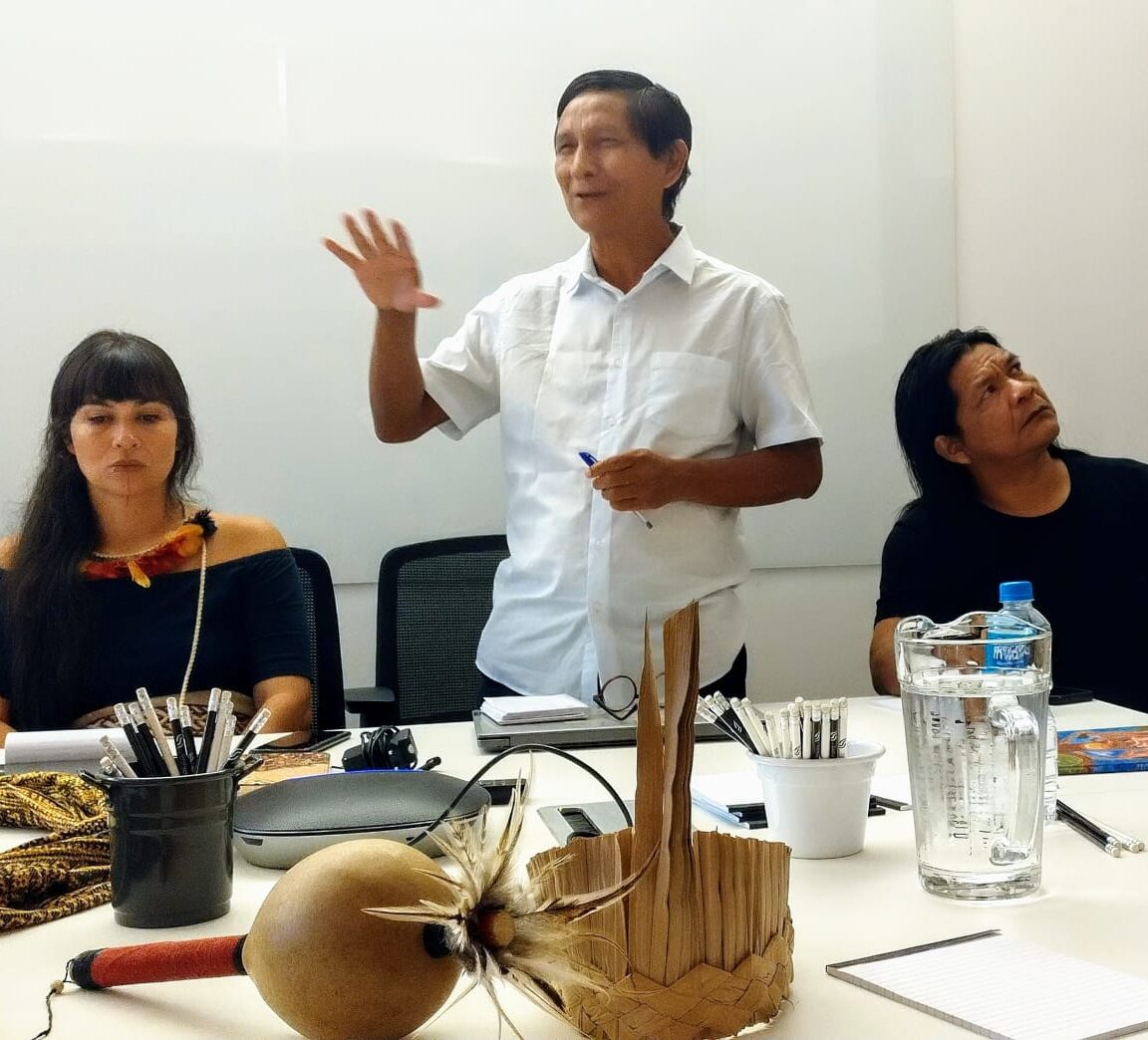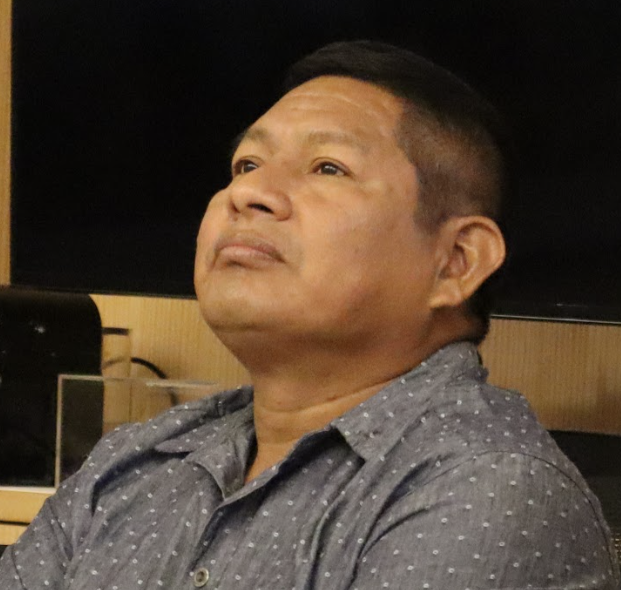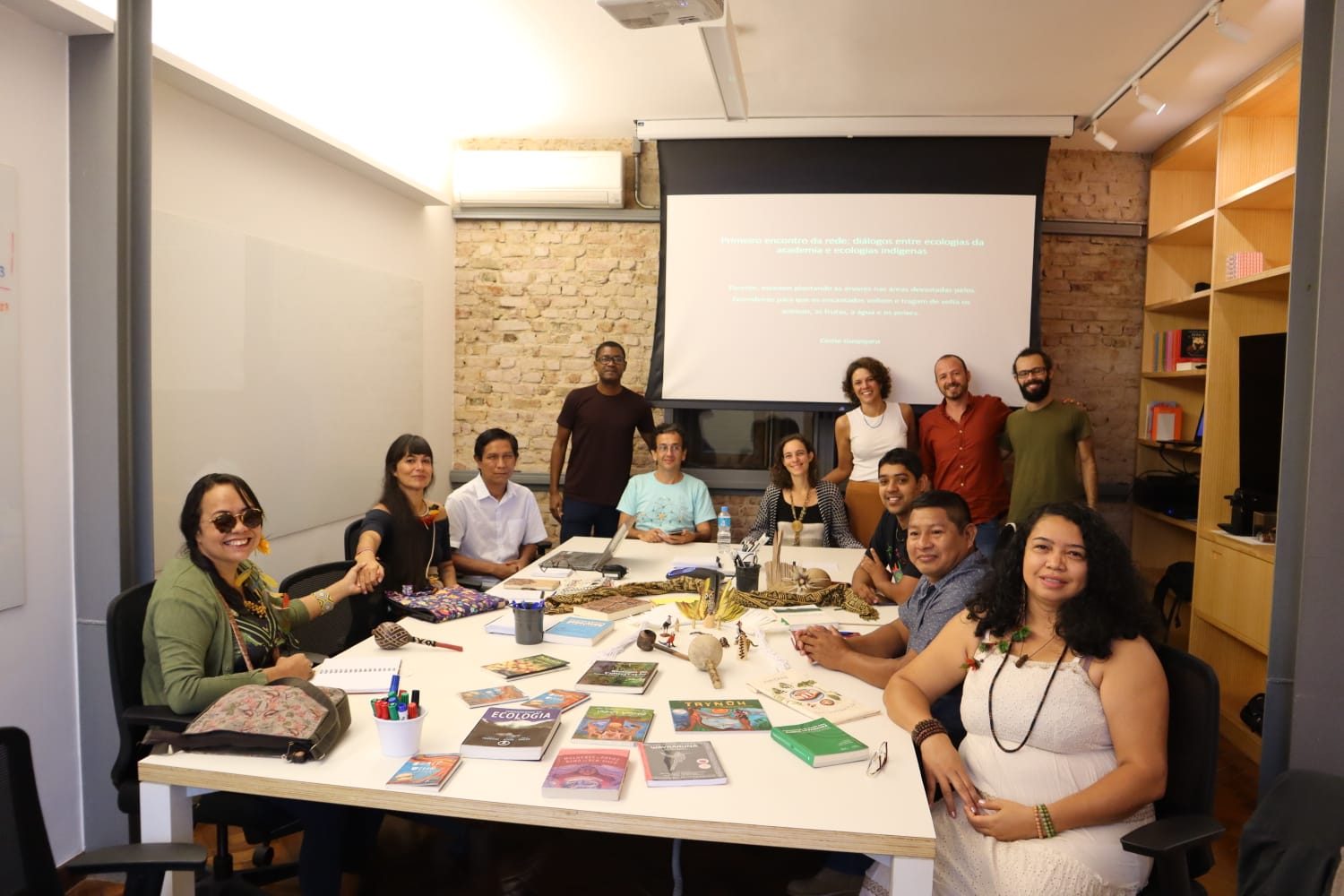
A meeting brought together indigenous scholars and ecologists to discuss principles, strategies, and projects to foster dialogues, on an equal footing, between academic and indigenous sciences.
The possibility of continuing the ancestral struggle using the arrows of contemporaneity. That's how Bárbara Flores, from the Borum-Kren people of the Inconfidentes Valley (Espinhaço Mountain Range), described the meeting between indigenous scholars and ecologists promoted by the Serrapilheira Institute on April 29th and 30th, 2024.
The meeting discussed principles and strategies to foster dialogue between academic and indigenous epistemologies.
From these discussions, projects were outlined that address the confluence between (i) indigenous sciences, practices, and struggles and (ii) the systemic and multi-scale view of academic ecology on the processes shaping biodiversity, ecosystem functioning, and their accelerated changes imposed by human actions.
Cristina Caldas, Science Director at Serrapilheira and organizer of the event, explained the motivation for its realization by stating, "
we are betting on the approach between indigenous ecologies and academic ecologies to pave new paths in science and knowledge“.
This initial event brought together indigenous researchers from the Borum-Kren, Puri, Pankararu, Bará, Tukano, and Potiguara peoples who are supported by the Serrapilheira Institute.
Rafael Raimundo, from the Graduate Program in Ecology and Environmental Monitoring at UFPB and one of the event's mediators, reports that
We had an important moment of discussions on knowledge production in a multicultural context. Inspiring proposals emerged, connecting academic and indigenous ecologies.
This opinion is shared by Carolina Levis, from the Graduate Program in Ecology at UFSC, another ecologist who acted as a mediator of the activities: "It was a transformative meeting and the starting point of something very innovative and important for the future of our country. We aim to promote a multicultural ecology based on respect and appreciation for indigenous sciences, integrated with cutting-edge ecological science
, stated Levis.
Recognition of indigenous sciences
Anthropologist João Paulo Lima Barreto, from the Tukano people and another of the mediators of the meeting, emphasized the importance of transcending approaches that treat indigenous sciences as "ethnoknowledge". João Paulo's provocation set the tone for the debate on the term " on an equal footing" , which characterizes the proposal for the dialogue between sciences within this network of multicultural ecology. For this equality to exist effectively, it is crucial to remove hierarchies between indigenous and non-Indigenous knowledge systems. Historically, academic sciences of European origin have expanded over South America, institutionalizing themselves as hegemonic mechanisms of knowledge production. This hegemony has eroded the epistemic diversity associated with traditional knowledge about biodiversity and ecosystems, jeopardizing the modes of existence of indigenous peoples and making their knowledge and practices targets of biopiracy and biocolonialism.
João Paulo Barreto emphasizes the importance of discussing indigenous science without implicit hierarchies: "it's a different and equally important knowledge system."
Indigenous peoples have inhabited this territory for 22 thousand years, managing the forests, rivers, land, and cosmos. We have developed technologies such as architecture, ceramics, food processing, and storage technologies. And also medicine. When I use the term medicine, I am using it in the sense of the art of care, health, and healing. All peoples have their art of healing, care, and health. The science that arrived with the colonizer, 524 years ago, came with the arrogance of disqualifying other knowledge models. It began to translate our knowledge models into the realm of religion. It is no wonder that even today our knowledge is still translated as something sacred.

Dr. João Paulo Barreto, in his speech about the meaning of dialoguing epistemologies and the care with terms referring to Indigenous sciences that convey implicit hierarchies.
The terms sacred, faith, spirit, spirituality, prayer, healer, God refer to religion. They are used to translate indigenous knowledge. It is very important for us to reflect on this issue because we are discussing the symmetry of knowledges. How can we deal with different models of knowledge? Academic science still classifies other knowledge models based on its own logic. It is very common for academia to translate our sciences using the term ethno. Everything becomes ethno when it comes to indigenous knowledge. Ethnobotany, ethno-history, ethnoknowledge, ethnomathematics. Everything in the ethnological key. Another way they use to approach our knowledge models is the key of ancestry. Ancestral knowledge, millennia-old knowledge, and also traditional knowledge. But these notions of ancestry, traditional, and millennia-old, ultimately convey an idea that this knowledge is unsystematic and, therefore, not knowledge, not science. That it's something magical. That it's myth. That it's legend. So, when we don't reflect on these translations, we fall into the trap of reproducing these terms and differentiating the validity of knowledge models, but it's not like that.
I understand that we are simply facing different knowledge models Indigenous peoples build or transmit knowledge orally. Orality is fundamental for us. For us, the word itself is not abstract. The word for us is concrete. Therefore, orality is important. In other knowledge models, such as in academic science, knowledge mainly comes through writing, books, and schools. Academic sciences and Indigenous sciences are different knowledge models. Neither of the models is worse or better. And now it's necessary for us to reflect on this in order to truly bring about dialogue.
When I bring up the criticism of using the term ethnoWhen I criticize the use of the term, I am drawing attention to the trap of placing Indigenous science as almost science. Almost does not mean equal. The key ethno captures indigenous knowledge and puts it within the logic of academic science and its boxes. Our effort should be to put academic and indigenous research on equivalent terms to promote understanding by people who are not familiar with Indigenous knowledge. So we come to discuss, bring, debate all this, to build a possible path of dialogue. As the indigenous knowledge model is different, we need to be aware, indigenous and non-Indigenous researchers, of the following: we are not creating indigenous knowledge. We are only translating it into equivalent terms to dialogue, to show that the indigenous knowledge model is also complex and dynamic, systematic, with its notions, categories, concepts, and explanations. So, our effort is to build a dialogue between knowledge systems that are different but equivalent in importance. “
The creative force of
dialogues on an equal footing
Non-polarization and mutual recognition are the foundations of a multicultural vision for socio-ecological research and innovations.
During the meeting, the care not to reproduce hierarchies between academic and Indigenous sciences generated a productive synergy between ecological concepts and understandings and their counterparts in indigenous worldviews. As a result, new research projects emerged, aligned with the multicultural vision of science and with the environmental and cosmopolitical context of indigenous territories.
"These projects can bring genuine innovations in the quest for sustainability. André Junqueira, an interdisciplinary scientist with experience at the interface between biodiversity and culture, who also participated in the meeting, stated that:"... to me, this meeting concretely highlighted the power of intercultural dialogues. Not only as a way to advance knowledge, but as a fundamental strategy in building a fairer future and transforming our relationships with nature
”
Reflective orality, listening, and other ways of constructing science
The principle of non-hierarchization between indigenous and non-Indigenous ontologies and epistemologies opens doors to the perception of multiple ways of constructing ecological understanding from the same empirical observations. During the meeting, Dr. Silvio Sanches Barreto, from the Bará people and who also served as one of the mediators of the activities, emphasized the importance of understanding and respecting indigenous modes of knowledge construction. Silvio spoke about the central role of orality as the means through which knowledge is passed down through generations in indigenous societies. It encompasses stories and a variety of oral teachings that include dynamic understandings —since they are modified by experience — about the functioning of ecosystems and the relationships between humans and other beings. Orality, listening, and collective construction are the foundation of indigenous sciences that deeply connect ancestral memory, identity, and territory. There is no doubt that academic ecology has much to learn in this context.
Silvio Barreto: "historical moment of confluence of concepts and methods in the multicultural construction of the house of science and technology"
“I want to highlight three impressions from this meeting that inspired me with new ways of thinking about ecology. First, we have never had this kind of dialogue of understanding and interaction with interculturality. We have never seen it. It is a historic moment to sit, to listen, and to promote a network of indigenous ecology. It is historic for us indigenous people. It is historic for Brazil and for science.
The second impression is the importance of better understanding the methods that each one uses. Every science, indigenous and non-Indigenous, has its method, its language, its theorists, and its field of research. Here, I was able to contribute by bringing an ancient method from the Rio Negro, used from generation to generation. The person sits on a small stool to listen, to hear the knowledges. This method is that of listening. It's an art, a technique, a technology of listening. It's not just about hearing the sounds, the noises, melodies, beats, but about hearing constructed concepts.

Dr. Silvio Sanches Barreto, philosopher and anthropologist of the Bará people, comments on the first meeting of multicultural ecology promoted by the Serrapilheira Institute.
You begin to think about these concepts constructed by the ancients. You don't yet have full mastery of this knowledge; you're just informed, you receive the narrative, it's like raw material. It's a transmission of knowledge for your life. Once you've heard a narrative, a story, learned a technique of art, hunting, gathering, building a house, clearing land for farming, weaving a basket, making a bench, making a paddle, making a canoe. You learned a technique. Then you start to delve into the content, start to incorporate, start to realize that those narratives, those stories, bring the way of making a certain object or artifact. In the next step, once having this access, having received the technical narratives, the science or the mythology, you will start to think, you will dissect what you heard. You will say, oh, I didn't know that, that's cool, beautiful. You will begin to systematize from the stories told, from the narrated knowledge, from the lives lived, then you will understand how it is possible to live with these theories, with this knowledge.
The third impression, very important, is the relationship between academic ecology and indigenous ecology. Ecology, in the etymology of the word, is about the house. We, indigenous people, also have the same version that the world, the universe, is formed by layers. And each layer is a house. Every place found in the forest is a house. A place having a name is important. Not only to be a house, but also a house that has a name. The mountain, the hill, the forest, the river, the lake – they are houses, they a place that has a name. Houses have names and have managers. So I usually say that each place has an agent, each place has a cosmopolitical manager.
I saw that academic ecology and indigenous ecology complement each other. We have another way of doing ecology, another way of talking about ecology. It's wonderful that this is the beginning of a good understanding. The house is being built by both ecologies, academic and indigenous, as a house of knowledge, as a house of science and technology.
Connecting academic and indigenous concepts and methods
FOUNDATIONS OF ECOLOGY
The activities included an overview of ecological theory and various experimental approaches to the study of biodiversity. The presentations and discussions were moderated by ecologists Carolina Levis (UFSC) and Rafael L. G. Raimundo (UFPB). In this way, multicultural dialogues also benefits from a broad view of academic knowledge regarding the processes that structure biodiversity and ecosystem functioning. Rafael Raimundo reported that "navigating through academic ecology, these indigenous scholars demonstrated understanding of relationships between processes at different spatiotemporal scales and levels of biological organization. This allowed us to discuss convergences of ecology with Indigenous ecologies, their territories, and struggles, thus envisioning the potential of this multicultural network.
SOCIO-ECOLOGICAL NETWORKS
In addition, contemporary perspectives for biodiversity conservation and management, ecosystem restoration, and adaptive governance were discussed in their interfaces with the indigenous context. The synergies between Indigenous knowledge systems and the vision of socio-ecosystems as complex adaptive systems inspired new projects and forms of dialogue. Carolina Levis explained the origin of these synergies: "as they refer to the dynamics of complex systems, multidimensional and holistic understanding is crucial in proposing solutions to socio-environmental problems. And this way of thinking is very present in indigenous knowledge systems.
Participants
In addition to the mediators, the following indigenous researchers supported by the Serrapilheira Institute participated in the meeting:
Dr. Aline Rochedo Pachamama
Puri People of the
Mantiqueira Mountaing Range
The meeting allowed academics to see us in terms of our backgrounds, freeing us from the shackles of racial literacy. We are science and we are history, but not in academic models. As a historian and artist, this perspective of dialogue brings me inspiration to sow memory and cultural expression for the flourishing of Indigenous natural sciences.
Dr. Bárbara Nascimento
Flores
Borum-Kren People from
the Espinhaço Mountain Range
"It was a milestone in indigenous science for the interaction with concepts and methods of academic ecology. It helped me understand how to contribute to the formulation of public policies that promote biocultural restoration in dialogue with indigenous territories and their cosmopolitics."
Dr. Elizângela Cardoso
de Araújo Silva
Pankararu People of
Pernambuco Hinterlands
The meeting allowed me to build a bridge between the foundations of ecology and the focus of my research: the processes of displacement of indigenous families in response to cycles of food abundance and scarcity and their disruptions due to environmental changes. It was a watershed moment that pointed to future directions
Dr. João Rivelino Rezende Barreto
Tukano People of the Upper Negro River
It is very rare for us to experience things like this. Indigenous academics face a lot of prejudice. We are seen as outsiders, not as professionals. So, I was very happy to be treated as a scientist. I felt respected. No one had ever called me a scientist before. This strengthens us and gives us confidence, just as the theoretical training in ecology as a basis for dialogue with Indigenous science was crucial.
.”
Dr. Victor Felix
Potiguara People of Paraíba
As an indigenous person, it was very significant to meet with a group of indigenous doctors. As a researcher, it was a step forward to discuss with different people and institutions how indigenous ways of thinking and realities can align with academic ecology.
Williams Leandro da Silva
Potiguara People of Paraíba
This meeting brought good fruits to my way of seeing the world. It enriched me greatly as an academic and as a person. I saw that it is possible to combine academic and indigenous knowledge. It was an incredible experience, a true watershed moment
.”
Integration of Paraíba projects into the multicultural ecology network

Three projects based in Paraíba are integrating into the multicultural ecology network supported by the Serrapilheira Institute:
– the project on adaptive socio-ecological networks by Rafael Raimundo (Campus IV of UFPB), in synergy with DATAPB and the International Joint Laboratory on Sustainability IDEAL;
– the Potiguara Soil Science project, led by Dr. Victor Felix (FIOCRUZ-RJ);
– the project Planting a Potiguara Living School co-proposed by Rafael Raimundo and Victor Felix in association with Selvagem – Cycle of Studies about Life, led by Ailton Krenak.
For Rafael Raimundo, the integration of Paraíba into the multicultural ecology network has great potential for growth because it aligns cutting-edge projects existing in the state with equivalent projects from other parts of Brazil:
"We are sharing ideas and experiences for the biocultural conservation and restoration of territories that face common challenges, based on the valorization of diversity and the dialogue of knowledges on an equal footing. These creative links between territories and indigenous and non-indigenous researchers who recognize each other as equals generate a multicultural science in tune with deep Brazil. And this synergy has incredible potential to shape a network with truly revolutionary emergent properties," Raimundo opined.
Photos: Pedro Lira - Instituto Serrapilheira.
